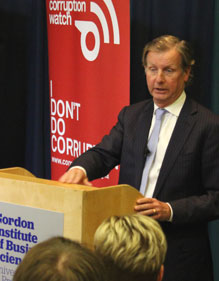|
Getting your Trinity Audio player ready...
|
 By Valencia Talane
By Valencia Talane
South Africa’s corruption dilemma is a characteristic of the developing world, and it’s not unique to this country. There’s an urgent need, however, for the implementation of anti-corruption strategies which will enforce the abundant anti-corruption legislation already in place. This will spare South Africa the erosion of good business and political practices that mar the images of many other developing nations.
These were some of the views expressed by business leaders at the second Corruption Watch/Gibs business colloquium held in Johannesburg on Wednesday, under the theme Competing in Global Markets – The Corruption Challenge. The aim was to discuss how South African businesses large and small can compete cleanly in challenging environments, both locally and globally.
Corruption Watch’s executive director David Lewis opened the proceedings by calling on the private sector in South Africa to come to the party and help organisations like Corruption Watch develop a winning formula for rooting out corrupt practices between business and the state.
“Feedback from business in the engagements that we have had with them has been uniformly positive and encouraging of what we do,” said Lewis. “The more accurate response is that businesses do not get involved in public issues, they solve their own problems in their own businesses.”
Lewis called for a conversation in which business leaders can help direct the process of combating corruption across different sectors.
Brackett Denniston, general counsel for US conglomerate General Electric, delivered the keynote address, in which he shared his company’s experience with confronting bribery and corrupt practices in the multiple countries in which it operates.
South Africa tolerates poor leadership
FirstRand’s group ethics officer Willem Punt shared the view that often business is viewed outside of its societal context, and that gives the impression that it can be held at a different standard to the rest of society. “South Africa tolerates poor leadership and institutional decay,” he said. “There is no room for principles if you build societies around who you are and who you know and who you are connected to.”
Education is the key, he added, for foundational building of good institutions that have good leaders – but it will take major interventions of educating business practitioners about good ethics and principles to turn the situation around.
“A badly-run or weak institution is very prone to corruption,” said Punt. “If you run a ship well, it is generally more resilient to corruption.” He asserted that South Africa’s position on corruption has to be viewed in the context of the dynamics of the developing world. Corruption, he said, lends itself to the societal needs of a developing country in a different way than it does in a developed one.
“In the developing world, corruption is defined as paying for something you’re entitled to, while in the developed world it means paying for something you are not entitled to.”
Legislation must be backed by willingness to enforce
The panel, which was moderated by Adrian Saville of Cannon Asset Management, and also included Vuyo Hlaka, Sasol’s group executive for advisory and assurance, and Nku Heita-Nyembezi, CEO of IchorCoal and chairperson of the JSE, agreed that for the strong existing legislation to take effect in combating corruption in the public and private sectors, there needs to be a strong willingness to enforce it and therefore punish transgressors.
Heita-Nyembezi said companies will not act against their best interests, so they tend to keep what is wrong to themselves to avoid reputational damage. “But if the leadership of a company knows that there has been contravention of the law, they will act.”
She added that instead of chasing idealistic solutions to the current problem, South African businesses and players within the anti-corruption field should work with where we are as a country to solve the problem.






